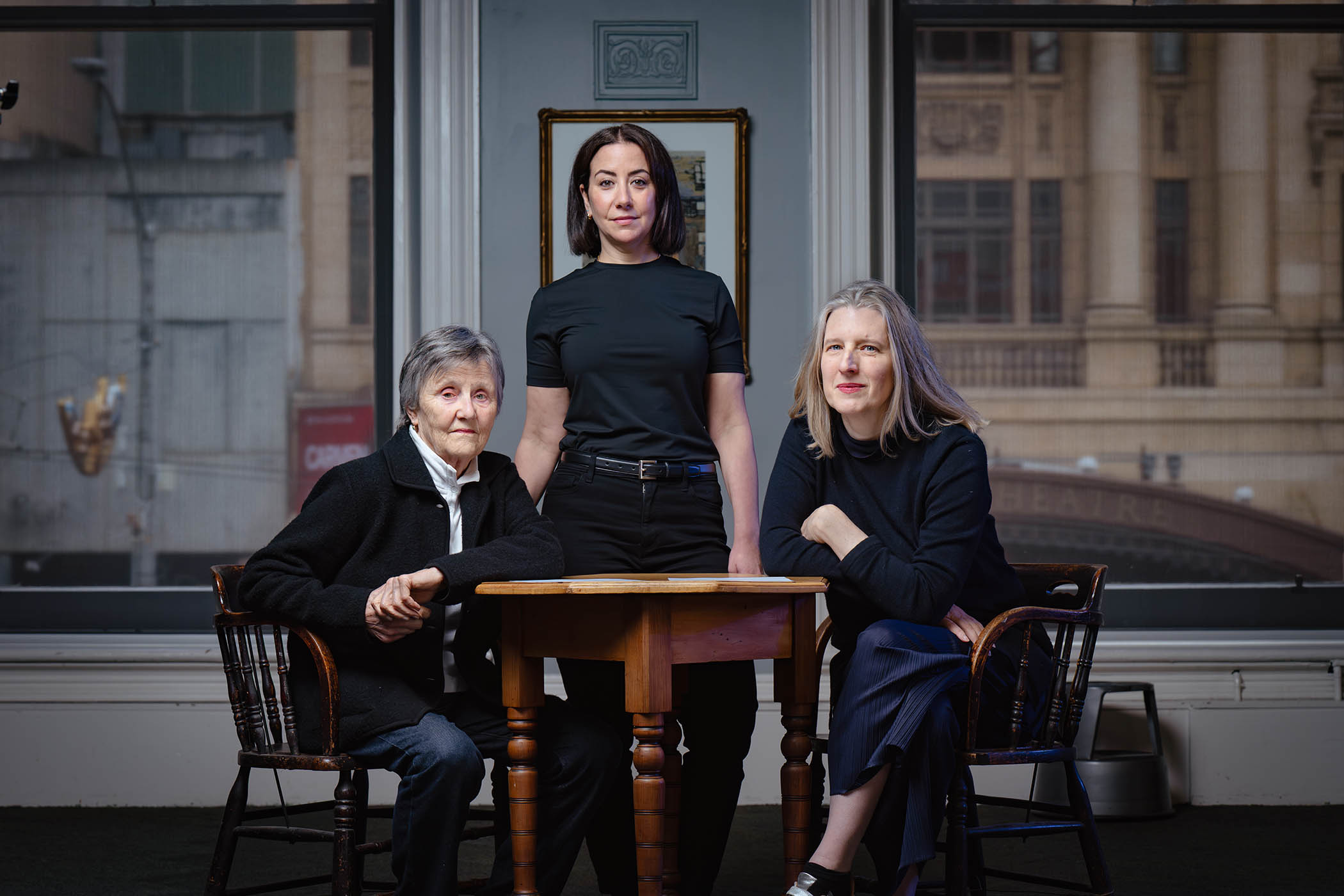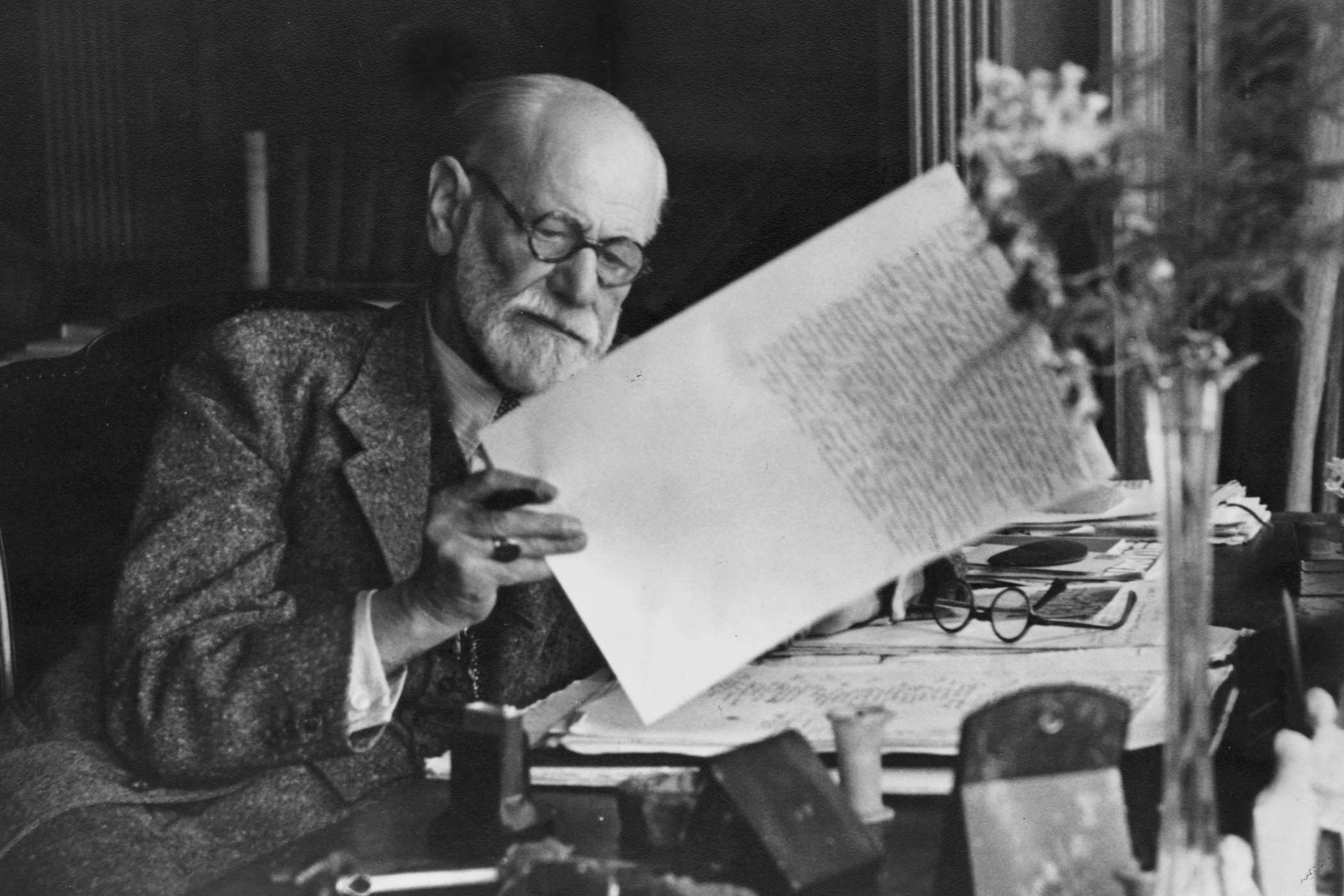Earlier this year, Erin Patterson stood trial in a small courthouse in South Gippsland, Australia, accused of murdering three members of her family – her in-laws Gail and Don Patterson, and Gail’s sister, Heather Wilkinson – using death cap mushrooms in a beef wellington she served them for dinner. The detail of the trial was beamed far beyond Erin Patterson’s small hometown. True crime writers Helen Garner, Sarah Krasnostein and Chloe Hooper followed the case from afar, but as it unfolded, they decided that the truth was stranger than any fiction. They had to be at the trial themselves…
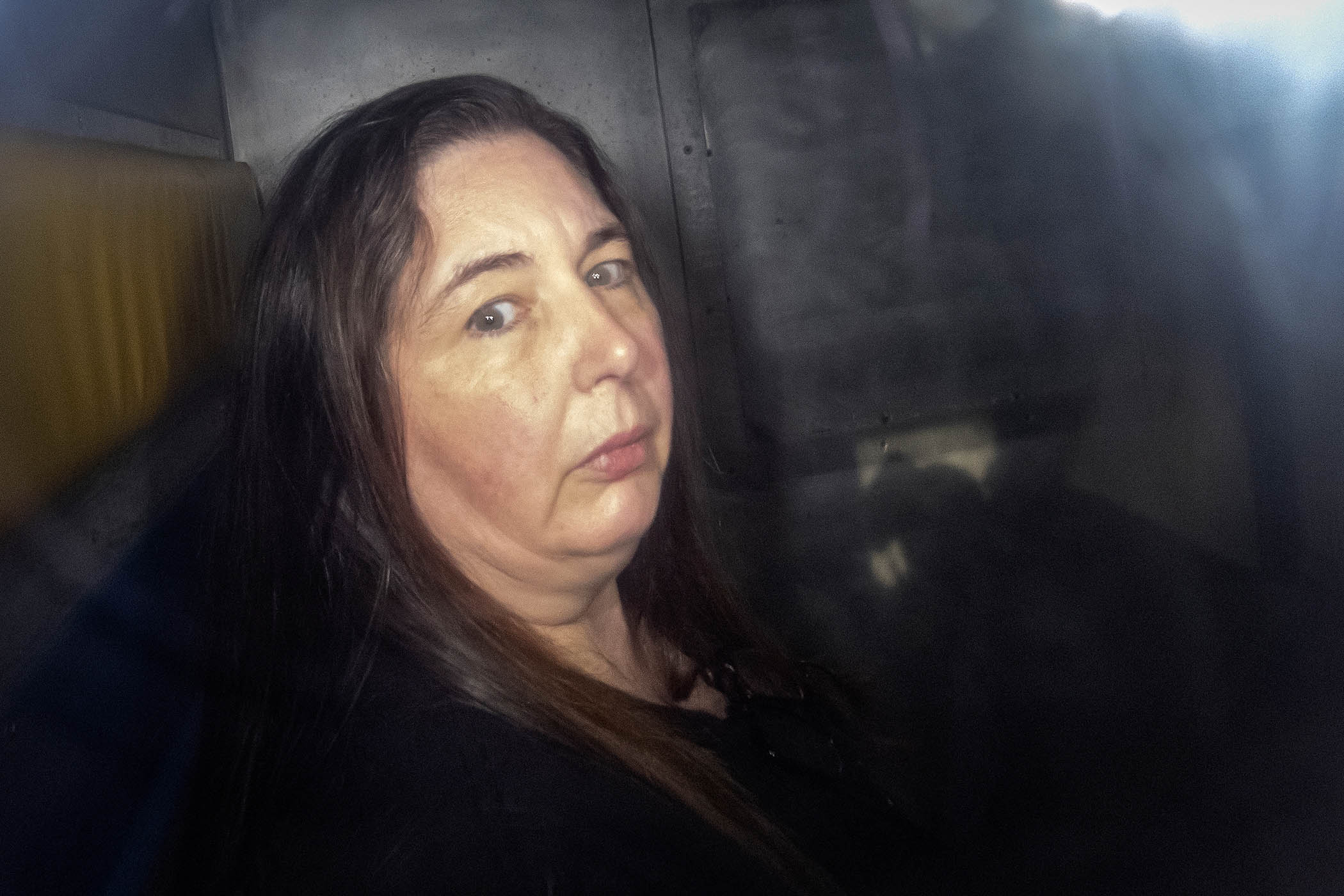
Erin Patterson arriving at court in Morwell, Australia
It starts and we are not even there. Everyone in the world is talking about it. People say to us, you must be going. No, we answer. No. No. No.
A woman is being tried for triple murder.
In the small town of Leongatha in South Gippsland Shire, Victoria, the woman welcomed her estranged husband’s parents, and his aunt and uncle, to lunch at her new house.
She served the group, all of whom were devout Baptists, four individual beef wellingtons, mashed potatoes and green beans.
Within days, three of her guests were dead from death cap mushroom poisoning, and the fourth was in a coma.
Heads turn to watch the trial. We see them start to stir. Via a media audiolink, we listen to the evidence of the woman’s estranged husband. One wild domestic detail galvanises us: his dying aunt remembered that the guests ate off four grey plates, while the hostess served herself on an orange one.
On day five, we get in the car. We head out of the city in a south-easterly direction. Sarah Krasnostein is at the wheel, Helen Garner and Chloe Hooper are her passengers. We’ve never travelled anywhere together before. We’re writers and we’re friends, but this morning, we’re almost shy of each other, not 100% sure how we’re going to handle the day.
None of us wants to write about this. And none of us wants not to write about it.
Chloe: But if we were writing about it, what would our opening line be?
Newsletters
Choose the newsletters you want to receive
View more
For information about how The Observer protects your data, read our Privacy Policy
Helen: Here’s one: “Breathes there a wife with soul so dead, who never to herself hath said, I’ll kill them all and run away.” For some reason, it just shot into my head. I am shocked.
We check this is recording, just in case.
Sarah: Maybe we should locate ourselves. We’re in my grey car and we have a two-hour drive ahead.
Chloe: The sun has just come up. There’s a fish-scale sky and people are moving along the freeway to their jobs. Here’s my opening line: In every house, in every street along the M1, lives someone who knows the feeling of love gone wrong.
Sarah: Well, I can’t stop thinking about the orange plate. So my line is: “Twenty-two months after she served her lunch guests beef wellington, the distinctive orange plate off which Erin Patterson had eaten came spinning out of the past like a frisbee and landed in front of the jury considering her murder charges.”
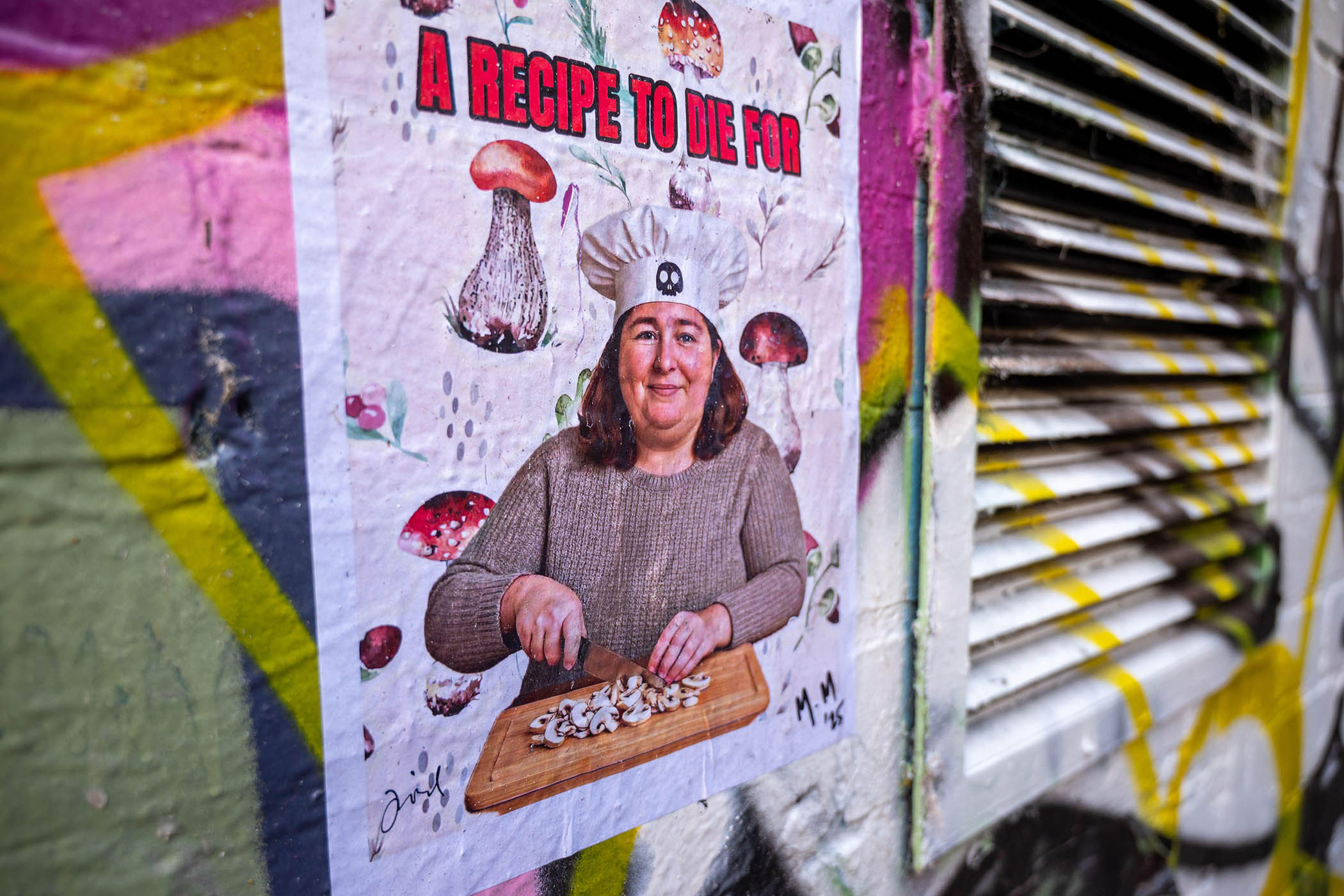
Street art in Melbourne depicting Erin Patterson
In Morwell’s courtroom, seats are mostly reserved for the Patterson and Wilkinson families, their church supporters and six balloted media representatives. The room is panelled in honey-coloured wood and is full of light, which streams in through a large picture window. Aboriginal artworks line the walls.
Due to its size, everyone is close together – and everyone is also close to Erin Patterson.
She sits in the dock at the back of the courtroom, flanked by two custody officers. She wears a taupe-coloured top. Her hair is long, dark and straight. Out of politesse, she smiles slightly if someone meets her eye, then moves her gaze. The woman who appeared on national news bulletins weeping flamboyantly for her dead relatives has disappeared. The gravity of the room has stripped away any layer of the ridiculous. The layout means Erin is now surveying the media and everyone else in the court.
We find spare seats in a row directly in front of her. From our vantage point, we can see Justice Christopher Beale sitting, at altitude, behind the bench, his clerk at a computer nearby.
The black-robed barristers sit before piles of folders at the long bar table in front of the bench. To the left is Patterson’s defence team, led by Colin Mandy SC (senior counsel), a man in his fifties with short, dark hair in a widow’s peak, and a way of tilting his head and looking up from under his brow with a sombre, measuring expression. To the right, are the lawyers for the crown, led by the fast-moving Nanette Rogers SC. She has a habit of ruffling her grey, curly hair with an impatient two-handed movement.
To our right is the jury: 15 people, randomly selected from the surrounding towns.
A man is ushered in and walks calmly to the witness box. It’s Simon Patterson. Bald, with a flushed complexion, he is a dignified presence in a grey suit and white shirt. An art nouveau vine twists down his tie. He does not look in Erin’s direction and it is unclear what cord now connects husband and wife – whether it is love, hate, God or grief.
Simon had previously told the jury that Erin had invited him and his family to the Saturday lunch to discuss a health issue. At the last moment, he had cancelled. On Sunday morning, he received a call from his father, Don: his parents were heading to hospital with dire gastric symptoms. Simon then called to check on his aunt and uncle. Unable to reach them by phone, he drove to the Wilkinsons’ home. Ian and Heather were also in a terrible way, and he insisted on driving them to Leongatha hospital. On the way, Heather mentioned the single orange plate and asked: “Is Erin short of crockery?”
By Monday, the four guests had been transferred to Melbourne’s Austin hospital for urgent treatment. Simon described his final conversations with his mother and father: Don said that, when the meal concluded, Erin told her guests she’d been diagnosed with cancer. She needed the family’s advice on how to break this news to her children.
Don, a former physics teacher, had always got along well with his daughter-in-law, who, like him, was a reader and intellectually curious. Simon said that, as Don and Gail deteriorated in hospital, they were worried for Erin’s health. Mandy put it to Simon that Erin had only told her guests that she suspected she might have cancer, not that she had a positive diagnosis.
“It is possible there’s a flying teapot going around Mars,” Simon replied, “but pretty unlikely.”

Simon Patterson, Erin’s husband, pulled out of the meal at the last minute
By the time we leave the court, numerous camera crews and television journalists are standing idle. We pass them and find a cafe called Jay Dees just across the road.
Chloe: It struck me that, rather than us observing Erin, she’s observing all of us.
Sarah: Watching her requires fairly assertive turning of the head.
Chloe: I was thinking of what you said in the car. About how, actually, one should look at the accused. And so I did. She is a striking presence, isn’t she? And slightly unexpected.
Sarah: I wasn’t quite brazen enough to have a really good look. And she was very aware of being looked at.
Helen: She appears younger than she did in those photos taken before she was arrested. Her hair is longer and darker. My immediate thought was: she was once good-looking.
Sarah: I don’t find her unnerving, definitely not scary.
Chloe: Her gaze hit the side of her husband’s face.
Sarah: I had no sense of her being in any way different from anyone I would encounter.
Chloe: I felt conscious of her – I had a tiny shiver on the back of my neck.
Helen: What about Simon’s self-command. He’s really got a grip on himself, hasn’t he? But not in an awful way. To me, he’s being very, very careful, and he will not be rushed. He’s impressive and he’s likable. He won’t go along with something just to keep it rolling.
Sarah: But there’s strong emotion just beneath the surface.
Chloe: His tone’s even more astonishing when you think: this man has been in a coma.
Helen: He was in a coma! What? How did you hear that?
Chloe: I read about it in the Daily Mail. He wasn’t expected to live. In 2022, a year before the lunch, he was hospitalised a few times and his family were called in more than once to say goodbye.
Helen: I’m not a subscriber … Oh hell, what else have I missed?

Patterson’s house in Morwell, where the meal was served
Food is now being brought to us at our outdoor table.
Helen: The thing about female poisoners is, it’s the flipside of mothering. It’s the most appalling betrayal of what women are supposed to be like. We’re supposed to nourish and put in front of people food that brings life to them. This story is an inversion.
We read that Erin Trudi Scutter was born in 1974 to Heather Scutter, an academic and expert in children’s literature, and Eitan Hugh Scutter, a company director. She grew up in the middle-class, south-eastern suburbs of Melbourne with one sister, who later studied the fracture behaviour of volcanic glass. In 1992, Erin started a science degree at the University of Melbourne, then switched to accounting. She completed training, and worked for a time as an air traffic controller.
Chloe: This is from a former air traffic colleague of Erin’s. Erin “was regarded as something of a genius. She’s very bright and much brighter than people might think. She managed to get guys wrapped around her little finger, although she was very unkempt.”
Sarah: Unkempt?
Chloe: You mightn’t want her organising the skies, but it wasn’t a school of deportment.
Sarah: I presume that, in the past, poison was a common way to get rid of an abusive husband or elderly relative for inheritance purposes.
Chloe: Or to make them sick enough to control them. Is there a Munchausen-by-proxy situation going on?
Helen: Well, Mandy raised this possibility when he listed the suite of other illnesses that she’d previously claimed to have.
Sarah: I’m looking it up. It’s now called factitious disorder. It used to be known as Munchausen syndrome, where people feign a medical condition to elicit treatment or attention, or Munchausen-by-proxy, where they make others sick in order to play the caregiver.
Chloe: Poisoning your husband was once referred to as the “Italian method”. In the 17th century, an Italian woman sold bottles of odourless poison called aqua tofana. It was marketed as healing water.
Helen: Women had to use a sneaky method – a man could seize a weapon and turn it against you.
Chloe: On Saturday night, at a party, I was talking to a beautiful woman who is married to a difficult man. There are frictions around the children, and she said: “I feel when women give birth, something else is born. The placenta may as well be resentment.”
Sarah: Oh my God.
Chloe: I had a conversation afterwards with my partner about how, even in good relationships, there are moments where love brushes very close to hate. And he agreed. Rather too readily, I thought.
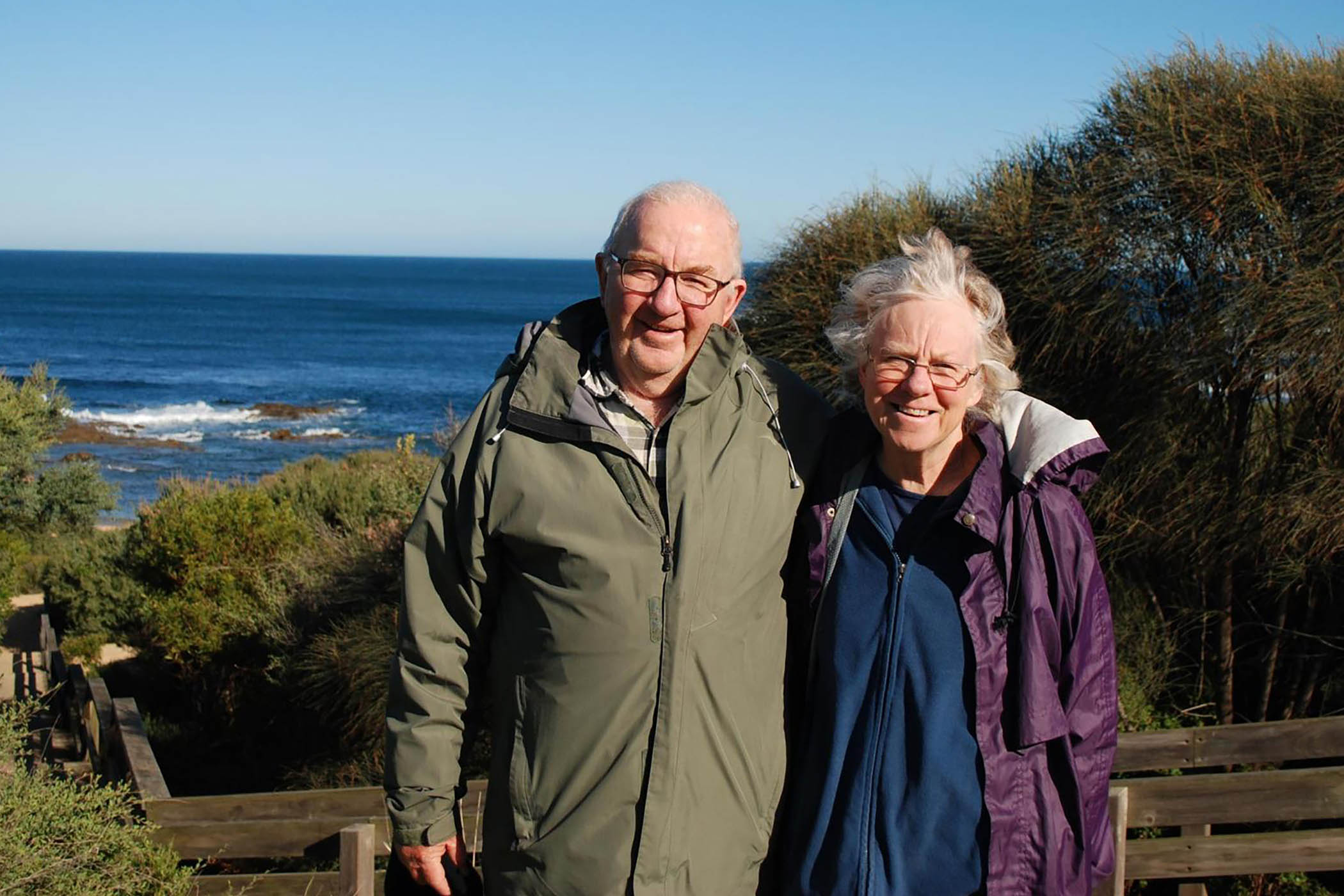
Don and Gail Patterson died shortly after eating Patterson’s beef wellington
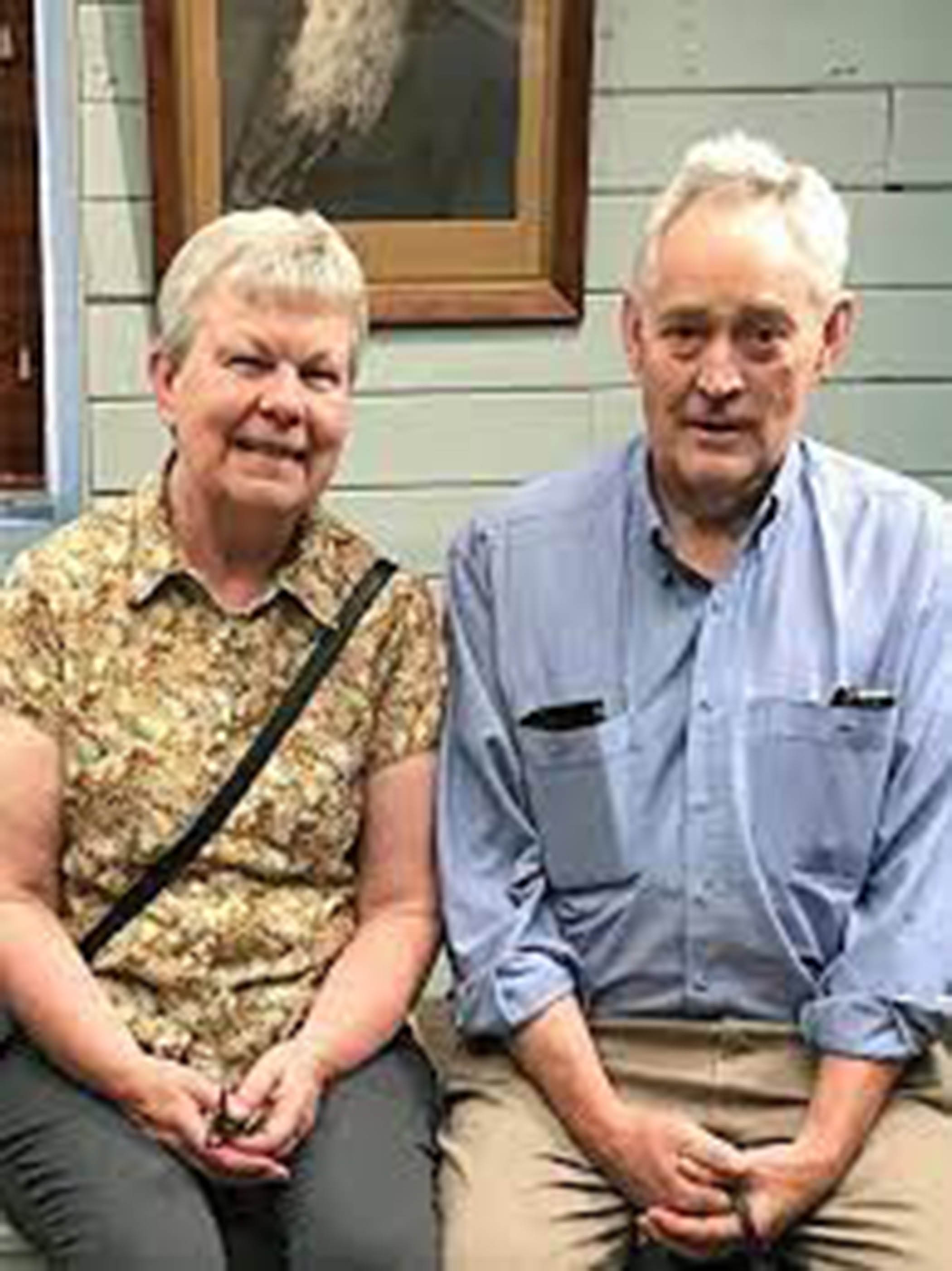
Heather Wilkinson, pictured with her husband Ian, also died
When court sits again after lunch, the prosecutor, Rogers, tells the jury that much of Erin’s socialising took place online. Using a number of different names, including “ErinErinErin”, Patterson joined such Facebook groups as Keep Keli Lane Behind Bars. Here, a thousand or so members discussed the case of Keli Lane, a star water-polo player who was accused of hiding five pregnancies and later convicted of killing one of her babies.
Other true crimes were discussed, but the group was riven by personal conflicts, and Erin then joined a breakaway chat group of 20 to 30 people called The Ex–Keep Keli Lane Behind Bars group. A smaller chat group again then formed, consisting of Erin and four other women. Three of them now testify one after another via video link.
Christine Hunt says that Erin shared that she and Simon had grown apart and were living separate lives. “I understood that she was self-sufficient, although she had some concerns about him paying his share … he was very controlling. She’d used the word ‘coercive’ at times and also that his family were very demanding and that she was really challenged by their demands.”
When asked how Erin painted Simon as a father, Hunt replies: “Abusive through that kind of coercive control was the sense that we were given. Disagreed with her lots, in particular around some medical things. [Her] being an atheist and Simon being from a very strong Baptist background, she found that very challenging …in particular the decisions around things like divorce, separation, and particularly around the kids’ education … She didn’t like it.”
On cross-examination, Mandy puts it to Hunt that, while Erin had been an atheist in the past, at the time of their group chats, she believed in God.
“I think she was two-sided on that,” says Hunt bluntly.
Daniela Barkley testifies that Erin shared details about her relationship with Simon. “Just sometimes how sad she felt, about how he was just so religious and how it was so difficult, I don’t know, to get along with him, I guess.”
“Did she post things about what she thought of Simon?”
“Just that he wasn’t a nice person.”
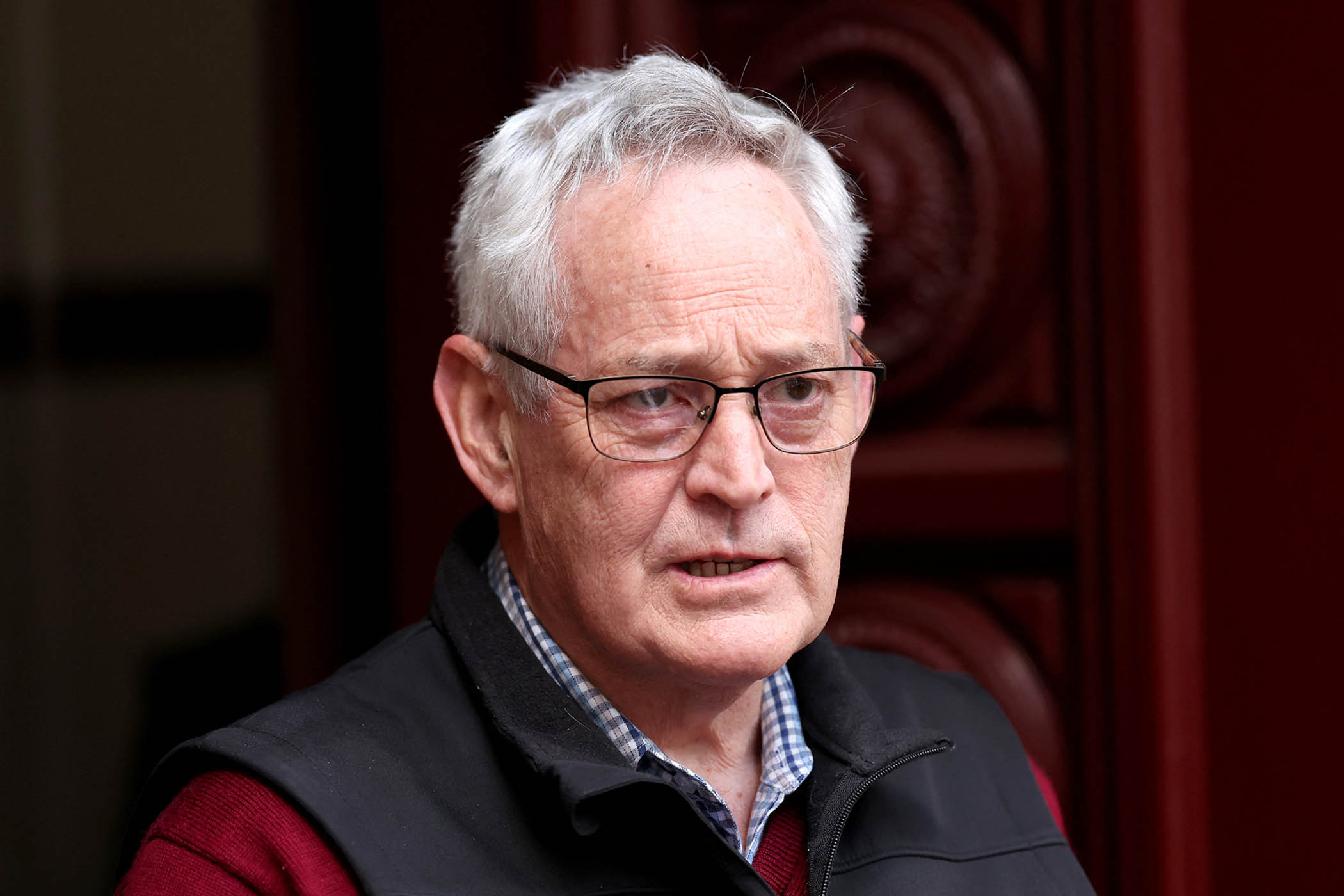
Ian Wilkinson, the only survivor, outside court in Melbourne in September
Court ends at 4 pm. We’re driving back to Melbourne.
Through the car windows, we can now see the outer suburbs of Melbourne and it’s growing darker.
Helen: I’m thinking about the tension between the couple. It was weird to go into the courtroom and see they were within metres of each other. I never saw Simon look in her direction. I saw her looking over at him and the family she’d once been part of.
Chloe: Do you think she has anyone who believes she is innocent?
Sarah: I reckon she would. At least one of those Facebook women.
Helen: Maybe she’s one of those really smart women who are a little bit crazy and whose emotional lives are hard for their friends to bear. You couldn’t really imagine having a peaceful friendship with her. No wonder she socialised online.
Sarah: I wasn’t surprised to learn all those friendships were with women she had never even met for a coffee. I’m thinking of distance again, how poisoning is damage you inflict at a remove. Would it be feasible to argue that she intended to just make the lunch guests really sick? That was the other bit in the data about the female poisoners – sometimes, it wasn’t intended to be lethal. It was to control somebody from a distance by making them sick.
Helen: I reckon she would have researched the right dose, and got a thrill from researching it and having that power.
Chloe: (checking on her phone) Consuming just one death cap mushroom can kill an adult.
Sarah: I keep thinking about psychological poison – the way the emotions that drive murder grow in darkness. Like mushrooms. All the dark feelings and personality traits we’re taught to hide or be ashamed of lurk there, in our psychic shadow. It raises the idea of the two faces. Who was Erin to her friends? Who was she to the family, at church, as a wife, as a daughter? Where do you start the story? Like, why is she even in that tiny courtroom and not controlling aeroplanes in the sky?
As for that bit they mentioned about Simon’s parents placing demands on her – that’s the flipside of belonging and inclusion. Perhaps that had started to chafe.
Helen: When the witness from the Facebook group spoke about him as being coercive and controlling, I thought of his face and saw it differently. It was the same face and it was the same composed expression that he had on the stand, but, suddenly, I thought: with a guy like that, it might be really hard to change his mind about anything. Who knows how much of that toughness has come to him since what has happened? It’s impertinent even to guess.
Chloe: The more straightforward Simon is, the more devious she is. The story is different, depending on how much you shade each of them grey.
Sarah: The way he tells it, she’s the one in control, always leaving him, and in her story, he is the one trying to control her.
Chloe: This is why people have attached so strongly to this case. Everyone knows how acrimonious things can get between ex-partners.
Helen: When my marriage was breaking up, I was going to a therapist, who said to me: “You’ve got the habit of bolting when things go wrong.” She said: “What you need to learn is you have to live the thing out to the end.” And it hit me: you can’t just walk out of a marriage. You have to blast your way out, or burrow your way out, or dig your way out.
Chloe: Erin bought her own house.
Helen: Yeah, but I’d like to know what pressure she might have been under, even after they separated. Was there pressure to come back? Divorce, for a practising Christian … I look at some people I’ve seen in the dock and I think: Jesus, I’ve been there, and somehow I didn’t crack – something in me stopped me from murdering. I remember when that poor Sudanese woman Akon Guode drove her kids into the lake. It was picked up on CCTV that she drove around and around the water in this big SUV full of small kids. And then she stopped, and she put her head on her arms on the steering wheel, and the kids were going crazy in the back. And I thought, every mother in this world knows that moment where you think: God, I can’t stand this any longer. A friend of mine said to me: “I have to know why she broke.” That’s what I’m always looking for in these stories. What was the point at which Erin just could not hack it any longer?
Chloe: She has elements of a fantasist. Who knows what she’s told herself about breaking.
Sarah: If she’s found guilty, I’d be surprised if she participated in a psych evaluation for sentencing. I think she would refuse to do that. She could come to believe that she’s innocent, either completely or in the sense of being justified. That’s how that kind of fantasy life works.
Helen: I feel even more confused now than when we started out … Oh, that’s where you did that daring U-turn this morning.
Sarah: We’ve come back to where we started.
Helen: This time in darkness.
Sarah: I wouldn’t want to go there with anyone else.
This is an edited extract from The Mushroom Tapes: Conversations on a Triple Murder Trial, which is published by W&N (£20) on 20 November. Order a copy from The Observer Shop for £18. Delivery charges may apply
The trial continued. On 8 September, Erin Patterson was sentenced to life in prison for triple murder.
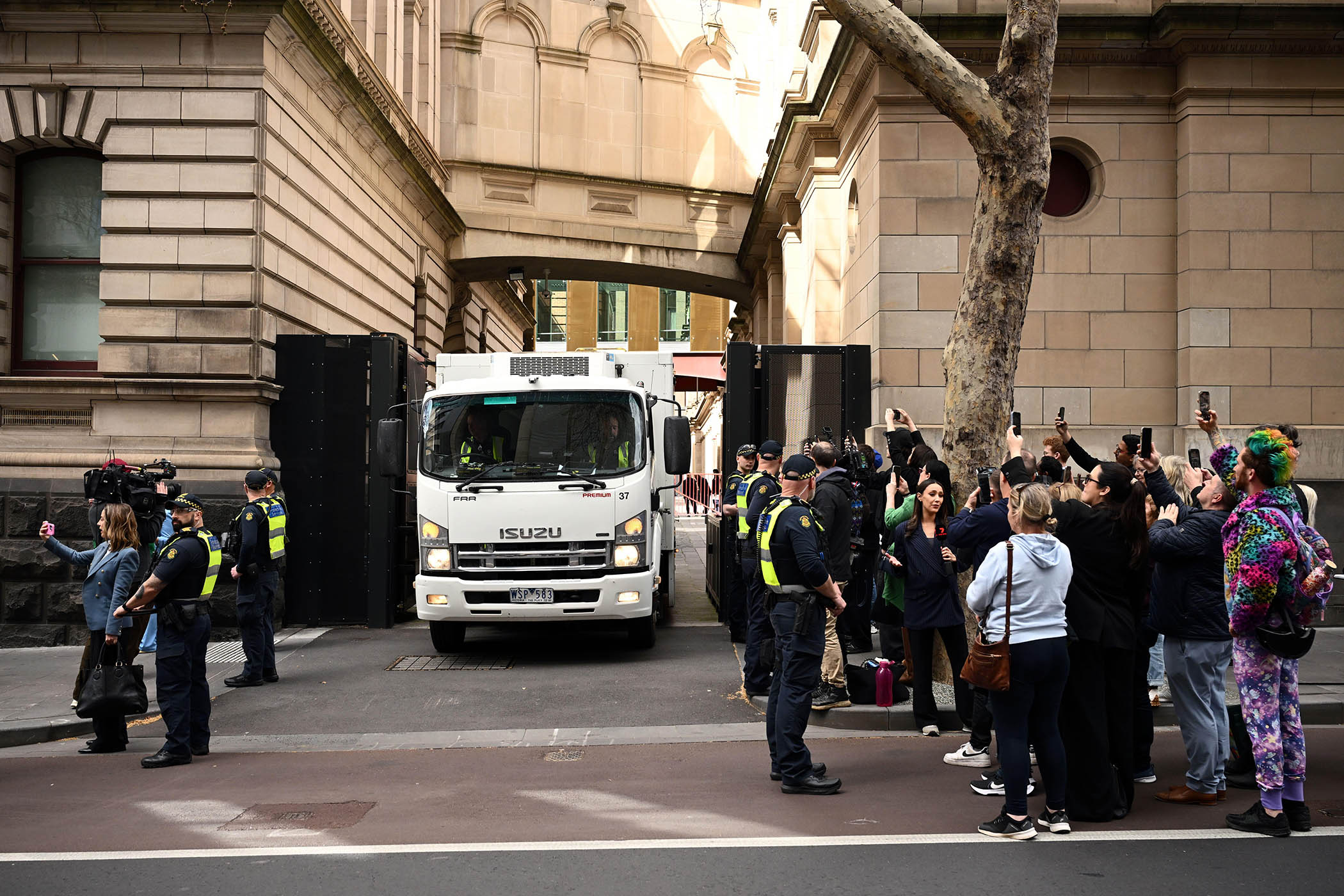
A prison vehicle carrying Patterson leaves a Melbourne court in September
Photographs by Darren James for The Observer, Getty Images, Alamy, Martin Keep/AFP
